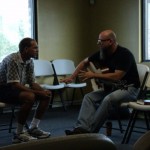Can you help me follow? Can you help me trust?
In one of my last posts, I asked the question, “What (Who) are we teaching people to rely on?” That post points out a major shift in my understanding of “making disciples” (discipleship) that has occurred over the last few years. That shift continues today.
What is the shift? The shift is away from information and facts about Jesus, and toward following Jesus and trusting him.
To be honest, most Christians would agree with me. Most would agree that discipling others is helping them follow Jesus and trust him. But, when you stop and think about all the energy, time, and resources that are spent on sharing information and fact, it seems that what we truly believe about discipling is not what we say we believe about it.
But, what would change? What would change in how I interact with people if I want to help them follow and trust Jesus instead of giving them information about Jesus? What would I do differently? What would I say differently? How would I pray differently? How would I give differently? How would I serve differently?
I think these are important questions. And, if we stopped to consider them seriously, we would have to admit that most of the things we do have little affect on helping people trust Jesus and follow him. Perhaps that’s why we have a tremendous amount of education going on, but believers still seem to be extremely immature when it comes to following Jesus and trusting him.
Also, this emphasis on sharing information and facts about Jesus explains why the people in the previous post (“What (Who) are we teaching people to rely on?“) were concerned that believers in certain countries don’t have access to all of those sources of information: conferences, books, commentaries, training seminars, Bible schools, etc.
So, what do I need to help me follow Jesus better? What do I need to help me trust Jesus more? Yes, I have the Holy Spirit, just as he indwells all of Jesus’ followers. But, we also all need help following Jesus and trusting him. And, in fact, the Spirit often works through those he indwells to help others follow and trust Jesus more.
How do we help each follow and trust Jesus? When I look at what typically happens and what is typically done and what is typically said as the church to one another, I don’t think most of it actually helps us follow and trust Jesus. It might help us fill encyclopedias, but it doesn’t help us grow and mature in trusting Jesus and following him.
What about you? What do you think it takes to help someone follow Jesus and trust him? Has your understanding of this changed? If so, how?
Radiating ripples of “private sin”
One of my favorite bloggers of all time is Brant Hansen. I’ve followed him through at least two different blogs. His series “If Jesus had a blog” is perfect combination of sarcasm and creativity, mixed with some genuine discipleship.
But, his latest post – which is not sarcastic at all – is one of my all time favorites from this all time favorite blogger. The post is called “The Myth of Private Sin.”
The point of Brant’s post is that sins that we may consider to be “private” actually affect the people around us. Some of those effects are obvious; some are not obvious. But the effects are there nonetheless.
Here are a few excerpts:
The older I get, the more convinced I am there is no private sin. They don’t all wind up on page two, but the surface of the pond is never undisturbed by the pebble. The ripples move well beyond ourselves, and, in many cases they radiate through generations…
But even if they didn’t know [about your ‘private sins’], the sins in your head aren’t private. Mine affect my attitude. They keep me from being concerned about other people. They make me a jerk, in seemingly unrelated ways. (“Why’s Brant a jerk?” “Probably something seemingly unrelated.”)
I would just add one more thought to this excellent post – and, please, take a few minutes to read his post.
There is another reason that “private sin” is not really private. If I am sinning, then I am disobeying God. If I am disobeying God, then I am not obeying God. This affects myself, and it also affects my brothers and sisters in Christ around me.
No, “private sin” is not private.
What (Who) are we teaching people to rely on?
A couple of weeks ago, I saw a video that surprised me. I mean, at first, I was excited about what I saw. The group that put the video together were very interested in helping some brothers and sisters in Christ who live in a very difficult situation.
Then, as I continued watching the video, I became less and less excited. According to this group, these people were struggling and needed our financial help because their pastors don’t have Bible schools, or commentaries, or study guides, or leadership training, etc. etc. etc.
I don’t know why this surprised me, but it did. It made me realize something… and ask myself a question: What (Who) are we teaching people to rely on?
I know that the group that put this video together had great intentions, and they truly believe that the churches in this country – in this difficult culture – needed these things. But, in reality, they don’t need these things.
In fact, the only reason that someone would think they needed these things is if we (i.e., people from the “developed” West) told them that they needed these things. Now, they are busy trying to acquire things that they don’t need, because we have told them that they need them. And, we are spending our time raising money to send them things that they think they need because we told them that they needed these things.
And, we all feel good about ourselves because of what we’re doing. But, what we’re really doing is teaching people to rely on things that they don’t really need.
As I thought about these things, I began to wonder why someone taught these brothers and sisters that they needed things that they don’t really need. Obviously, whoever taught them, thought these things were needed. Unfortunately, that means that the “teacher” was relying on these things as well.
What these brothers and sisters really need are people who will stand beside them and encourage them to trust God regardless of what happens in their situation. Could it be that we don’t know how to do this? Could it be that we’ve replaced trusting and relying on God with relying on these other things also?
It’s a difficult question… and a question that everyone wants to answer with “NO!” Of course we trust God and rely on him. But, is that the way we act as the church? Do we live as if we rely completely on him, or do we rely on our education, training, conferences, books, commentaries, leadership methods, etc.?
Perhaps… just perhaps… those of us in the West could learn something from our brothers and sisters in Christ who live in difficult situations. Perhaps they could teach us that we really don’t need all of those other things.
Preaching and Teaching in the New Testament was interactive… but do we care?
Jon at “Jon’s Journey” linked to two interesting posts that considered the methods of preaching and teaching in the Gospels and in Acts – that is, when Jesus was preaching or teaching and when his followers were preaching and teaching. Jon summarized the findings in his post “Interactive Teaching in the New Testament.”
Jon (and the original author of the posts) separate preaching and teaching examples from the New Testament into several nonexclusive categories:
- Unclear as to interaction
- Non-interactive
- Initiated by others
- Dialogue
- Includes action events
Interestingly, the original author began this study by searching for scriptural defenses and methods of preaching. His conclusions were not what he expected.
In fact, he found that most preaching/teaching examples in the New Testament included some type of interaction.
I suspect (although I haven’t done a formal study) that if the examples of preaching/teaching unbelievers and believers were separated, those involving only believers (i.e., the church) would include an even greater percentage of interaction.
But, I wonder… even given this evidence from the New Testament and even given the studies that show most people do not learn or grow through monologue preaching… will people even care? Is the modern method of monologue preaching and teaching in the church so ingrained that it cannot be changed?
It can be changed. I know from example and experience. But the question remains: Will people care?
Guest Blogger: Stumbling Behind Jesus
I’ve invited several people to write “guest blog posts” for this blog. There are several reasons for this: 1) To offer different perspectives. 2) To generate even more discussion and conversation between blogs. 3) To introduce other bloggers to my readers.
(If you are interested in writing a guest blog post, please contact me at aknox[at]sebts[dot]com.)
Today’s post was written by Scott Eaton. You can follow Scott on Facebook or on Twitter (@scottweaton).
————————————
Stumbling Behind Jesus
When setting up my Facebook page a few years ago it asked me to identify my religion. I sat there for a moment contemplating this question. You’d think it would be easy for me, but it wasn’t. I mean, really, what’s the hang up? I’m the pastor of a Christian church and a Baptist one to boot! But for some reason the question bothered me.
I suppose there were many reasons for this. First, I don’t really like “religion” at all. I’m not very good at it. Rules and rituals stifle and bore me. I can get into it for a little while, but after a bit I begin to just fall into a lifeless and legalistic…religion. I’m pretty sure Jesus didn’t call us to a religion but instead called us to Him. There’s a very big difference.
Secondly, I thought about putting down Christian. That does make sense, doesn’t it? After all, I am a Christian. If asked to check a box on one of those forms (like at the hospital) describing your religion I wouldn’t check Jewish, Muslim, Hindu or other. I’d in good conscience and with great conviction check Christian! Of course I would. So why not describe myself as Christian on Facebook? I’m not sure except it seems to me that most of the people in the USA who believe in God would describe themselves as Christian whether or not they genuinely are. I know that before truly coming to Christ I would have described myself as a Christian just because I grew up in a so-called “Christian” church. I suppose this is why Christian would not do.
Thirdly, I seriously considered placing some adjectives in front of the word Christian. Something like: evangelical, Baptist, Bible-believing, somewhat Reformed, conservative-moderate, free-thinking Christian. But this seemed kind of ostentatious, which is not a flattering characteristic of a Christian. So I figured I’d better keep thinking about it.
Fourthly, I thought about calling myself a Follower of Christ under the religion section on Facebook. Ah, yes, this would work! This is the goal of my life – to follow Jesus Christ! This gives more clarity to those who wonder. It makes more sense than just Christian (even though I unashamedly refer to myself as a Christian too). Christ-follower, that works. But something seems too confident in that assertion. It makes me appear as more than what I really am and makes my following of Jesus to be better than it really is. So I had to think of something else.
Finally, I got it. Under my religion I simply put: Stumbling behind Jesus. Why? Because this is what I do. I am a Christian who does follow Jesus. But follow Him perfectly – no way. My following of Jesus is more like stumbling. Stumbling is the right word. If Jesus were a trail guide leading me up a mountain path I would at times be there right beside Him, enjoying the conversation and scenic views. But more often than I care to admit I would trip over a rock on the path and stumble. Sometimes falling and sometimes falling hard. Instead of scenic views I lie bloodied in the dirt. At other times I feel like I can’t keep up with Jesus and never will. I have to stop and sit for a while in order to rest. Fortunately in those moments I hear Jesus say, “Scott, come to me, you who labor and are heavy laden, and I will give you rest.” And He does. He picks me up and carries me along, helping me to follow Him again. It is His grace and strength that are sufficient in my weakness.
I’m very grateful that God says in His Word, “The steadfast love of the LORD never ceases; his mercies never come to an end; they are new every morning; great is your faithfulness” (Lamentations 3:22-23). This is a great comfort to one who stumbles like me. But sometimes I’m afraid that I’m the only one who stumbles behind Jesus, even though I suspect it isn’t true. Sometimes I wonder if I’m the only one who loves Jesus and earnestly wants to follow Him, but finds it hard to read the Bible, hard to pray, hard to love, hard to serve, hard to sacrifice and hard to tell others about Jesus. I love Jesus but my flesh screams against these things. I know there are many followers of Christ out there who really love Jesus, but are there any other stumblers like me?
Maybe you’re reading this and thinking, “Yes! Stumbling behind Jesus describes me too!” You love Jesus, you follow Jesus, but you stumble. Maybe there are more of us than I think. Perhaps this is where Jesus wants us to be. Perhaps admitting our stumbling is the beginning of humility, contrition, and dependence that I believe God desires in us (cp. Isaiah 66:2; Isaiah 57:15).
Is it possible that we who stumble behind Jesus should just admit it and then we can all stumble together? When one stumbles another can help him up! When one falls, another can tend to his wounds. When a brother or sister is spiritually weak maybe we who are at that moment “spiritual” could help them in their weakness (Galatians 6:1). Is it possible that by stumbling together we might stumble less and actually become stronger, more faithful followers of Jesus? Is it possible that in this way we are the hands and feet of Jesus to one another? Wow.
Maybe it’s just me, but it almost sounds like this is what the church is supposed to be. “Let him who has an ear, let him hear.” Amen.
So, what’s the deal with all this pastor stuff?
Over the last few days, I’ve written several posts related to pastoring, pastors, and “pastors.” By pastoring, I’m referring to caring for God’s people, helping them, serving them, sharing your life with them. By pastors, I’m referring to people who spend time pastoring others. By “pastors,” I’m referring to people who have been given (or who have assumed) a certain title in a church organization.
(By the way, some “pastors” are pastors. Some pastors are not “pastors.” Are you confused yet? I hope not.)
Some of the posts this week were planned – posts such as this one, and “The dangers of ‘pastoring’ hundreds or thousands,” and “A little about my pastors.” Some of the posts this week were unplanned – that is, they were links to posts that I’ve read recently that happened to touch on the same subject, such as “But he has an MDiv and ordination papers,” and “What pastoring is NOT.”
So, why have I spent this week writing about pastoring, pastors, and “pastors”? Am I angry about church leadership? Do I have a grudge against people with the title “pastor”?
No, I’m not angry, and no, I don’t have a grudge against anyone with the title “pastor.” Some of my good friends have been given the title “pastor.”
So, why have I spent this week writing about pastoring, pastors,and “pastors”?
I care about the church, and I love to see God people grow and mature in their faith in God, in unity with one another, and in their walk with Jesus Christ. From my experience, the different between someone who pastors others and someone with the title “pastor” often causes problems in Jesus’ church – problems that hinder the kind of growth and maturity that I mentioned earlier.
So, I wrote these posts for two audiences:
1) I wrote these posts for those who have been given or who have assumed the title “pastor.” You have the title, but do you actually spend time caring for and serving other people? I know your initial answer is, “Yes.” But, I’m asking you to look deep down, into your own life and into the lives of those around you. If you do not know them well enough to look into their lives, then you are probably not pastoring them. Start caring for God’s people – even if it means that you can’t do the things that people expect from a “pastor.”
2) I also wrote these posts for those who do not have the title “pastor.” Guess what? You are still called by God to pastor others. God desires all of his children to spend time with one another, to share their lives with one another, and to help one another grow in maturity in Jesus Christ. This is pastoring, and God will do this work through you if you will allow it. Do not wait on people with titles to start caring for others. Start caring for God’s people now.
It really is that simple. Oh, it won’t be easy, and you will probably face opposition – even from those who should be your friends.
But, start pastoring God’s people anyway. Then, watch in amazement what God does through you. The people are his flock anyway. He wants to work through you (and others) to care for them. Give him the opportunity.
A little about my pastors
In my last two posts, I’ve talked about “pastoring” people. In one, I suggested that it is impossible for someone to shepherd hundreds or thousands of people. (See “The dangers of ‘pastoring’ hundreds or thousands.”) In the other, I suggested that we often consider the wrong things when we look for leaders among the church. (See “But he has an MDiv and ordination papers.”)
Given the topic of those posts, I thought this would be a good opportunity to answer a question that I’m asked fairly often: What are our pastors like? Well, thank you for asking. (And, if you didn’t ask, thank you for reading anyway.)
We’re a small group of believers by almost any standard. We typically gather with more than 2 or 3, but much fewer than 100. Even among a small group like this, we’ve recognized five mature brothers that we refer to as elders.
Each of these men have a family – with two, three, or even four children – and each of them works at least one full time job. (Since I am one of those recognized as “elders,” you can assume that everything after this refers to the others recognized as elders.) And, they are awesome at caring for other people!
Are they perfect? Of course not. Do they sometimes make mistakes? Yep. Do they have family, relational, work, financial, emotional, etc. struggles? Yes. But, I still say that they are awesome at caring for other people.
They spend time with others. They give of themselves over and over again. They serve. They teach. They help. They encourage. They constantly point people toward Jesus Christ. And, by the way, I’m not talking about them doing these things on Sundays when we gather together as a group of believers regularly. I’m talking about what they do daily.
But, guess what? While these men are great at pastoring others, these are not the only pastors in my life. God has placed many people in my life who are constantly caring for me and pointing me toward Jesus Christ and helping me walk with him. These people are my pastors as well. They teach me. They disciple me. They shepherd me.
Some of these people are students; some have been out of school for a long time. Some of them are younger; some are older. Some are men; some are women. Some are new believers; some have been following Jesus Christ for longer than I’ve been alive. Some meet with us weekly; some do not.
But, all of these people are pastors, and they all have one thing in common (besides being brothers and sisters in Christ): they spend time with me and my family in order to help us trust God.
These are my pastors. I wish I could share them with you. I know that they would be an encouragement to you just as they are to me.
Tell us about the pastors that God has placed in your life.
But he has an MDiv and ordination papers…
Jamal from “illuminate” has written a very good post called “Please Pray For Our Elders…” It goes along very well with my previous post “The dangers of ‘pastoring’ hundreds or thousands.”
But, in his post, Jamal tackles head-on something that I only intimated in my post: simply giving someone a title or position as “pastor” or “elder” or something else in an organization (even a church organization) does that mean that the person is actually shepherding or is actually mature in his walk with Jesus Christ.
Jamal writes:
These precious saints who ask me to pray for their ‘Elders’ are frustrated because their ‘Elders’ (wise ones in the faith) are not really wise in the faith. I want them to realize that putting a descriptive term like ‘elder’ (one who is wise in the faith) upon a person who is not wise in the faith makes no sense. Instead of being frustrated with these people, simply see them for who they are, and who they aren’t.
I want these precious saints to realize that if someone is not ‘wise in the faith,’ they are NOT an elder even if they do carry the job description or title of ‘Elder / Pastor.’ Simply realizing this could free many from being held hostage to a system or organization led by a set of ‘unwise’ people who carry the title of being ‘wise.’ After all, the title of ‘elder’ does not make a person ‘wise’ in the faith.
The problem is not really with these unwise ‘Elders,’ rather the problem is with the people who think the term ‘elder’ refers to some type of ‘office’ that carries a hierarchical weight that is separate from the person itself. This is foreign to the New Testament. It is absurd to look to someone whom we already know is not ‘wise’ in the faith and refer to them with a term that means ‘one who is wise in the faith.’
Today, churches tend to select people as leaders (elders, pastors, bishops, whatever titles they choose) based on education or speaking ability. Usually, the individuals are not actually known by the group of believers who select them (and hire them to do a certain job). So, in fact, people are called “elder” or “pastor” (or whatever) with little to no knowledge of whether the person is actually mature in the faith or actually takes care of people.
This is why one of my favorite passages of Scripture about “leadership” is Matthew 20:25-28. In effect, Jesus is telling them how to recognize who the REAL leaders are among his people. It doesn’t have anything to do with titles or education or ordination or anything like that. What is the main characteristic of a leader? That person serves others.
The dangers of “pastoring” hundreds or thousands
For most of my 30 plus years of experience in the church, “pastoring” was a function relegated to one or two (perhaps a few) and towards hundreds (or perhaps thousands) of people. So, on the average, one person was responsible for “pastoring” hundreds of others, while those hundreds were primarily responsible for being pastored.
From what I’ve seen in seminary and from the books and articles and blog posts that I’ve read, this is normal. Pastoring is seen as something that is done to hundreds or thousands of people at a time.
There is a huge problem inherent in this system: it teaches people to “care” from a distance in an impersonal and general way. This is not the way that Jesus cared for people or that we are instructed to care for people in the pages of Scripture.
Now, don’t misunderstand me. I’m not saying that Jesus or Paul or Peter or others did not speak to large crowds. They did. But they also made a distinction between the crowds and the disciples. Jesus spoke of the few “sheep” who heard his voice. He was their shepherd (pastor); he was not the shepherd for the crowd.
So, yes, we can and should proclaim the gospel to large crowds of unbelievers – whenever and wherever we have the opportunity. That’s not what I’m talking about, and it’s not what the authors of Scripture are talking about when they call for us to shepherd and care for one another.
So, what are the dangers of “pastoring” hundreds or thousands of people?
1) You do not actually know the people. You may tell yourself that you do; but you don’t – you can’t. Therefore, you can only deal with generalities or with big problems that are finally brought to your attention – usually long after the people actually needed help.
2) You teach people (by example) that this is the way that they should care for others. We wonder why other Christians do not get involved in each other’s lives, but this is exactly what is being modeled. They are “pastoring” others in the way they have learned from people “pastoring” them.
3) You change the meanings (unintentionally, certainly) of vast passages of Scripture. Those passages that talk about love, and care, and giving, and service, and shepherding, etc. must be reduced and modified to fit into the current system. The idea of actually getting involved in people’s lives – in both the good times and the bad – and letting them into your life, becomes impossible and therefore outside the realm of interpretation.
I didn’t write this post out of hurt or anger. I understand the position that many people find themselves in. But, I also understand the difficult of working through this problems. I’ve had to relearn what it means to shepherd people and what it means to be shepherded by others. Together, we’ve had to relearn what it means to care for one another and share our lives together. It is possible to change the way we interact with one another in Christ.
Some say that it’s impossible to change the system. I’m not concerned about changing the system at all. Instead, I’m more interested in seeing God’s people begin to grow in their relationship with God and their mutual relationships with one another. And, I think the idea that someone can “pastor” hundreds or thousands of people hinders that.
Are you resting in the presence of Jesus Christ each moment?
In the last couple of weeks, I’ve had something wonderful happen a few times – two that stand out. Each time, I was talking with someone who was struggling with relational or emotional issues. And, each time, the other person ended up encouraging me in Jesus Christ.
But, then, this is the way the Holy Spirit works through his children if we recognize that we are in mutual discipling relationships – that is, that we are helping one another walk in Jesus Christ. As I was growing up, I learned that discipling relationship were more unidirectional. Whether this was taught intentionally or caught by example, I don’t really know – although I could probably point to both options in my life.
While mutual discipleship would be a good topic for a blog post, that’s not the reason that I’m writing this post. However, it’s important to recognize that when I’m talking with someone, I’m not just wondering how I can help them follow Jesus. I’m always looking for mutual discipleship, knowing that Jesus could use anyone to help me follow him better.
In the two examples that I’ve been thinking about, two men were struggling. And, even though I was hoping to help them and encourage them in the midst of those struggles, I also recognized that these were brothers in Christ who were strong in the faith and who God has used previously to encourage and challenge me.
As we talked about trusting God through the circumstances of our lives – different circumstances, but the same need to trust God – they both asked me about my own life. That alone demonstrates the character and concern of these two brothers. Although they were struggling themselves, they also cared about me. They listened intently as I shared a few things, and they both asked me the same question (although perhaps phrasing it a little differently): Are you resting in the presence of Jesus Christ each moment?
I love that they asked me this! Seriously!
A few years ago, in different contexts, I would have expected Christians to ask me questions like these: “Are you having your daily quiet time?” “Are you reading the Bible every day?” “Are you faithfully attending church activities?”
Now, these can be good things, but they are – at best – means or methods that could possibly lead to the end that we should be seeking: resting each moment in the presence of Jesus Christ. This can also be stated as abiding in Jesus, or walking in the Spirit. But, the point is the same: For those of us who are in Christ, God is always with us through his Spirit. We do not have to conjure him or catch his attention. Instead, we must simply live in his power and presence instead of living by our own devices and plans.
My two friends had learned that while various activities (sometimes referred to as “spiritual disciplines”) might help me focus on Jesus Christ, the activities themselves are not the goal. And, asking about carrying out the activities could simply produce a feeling of false security. I can check off activities like praying or reading Scripture or attending church gatherings, but they do not mean that I am actually abiding in Christ.
So, are you resting in the presence of Jesus Christ each moment? Are you abiding in Christ and living in his power?










